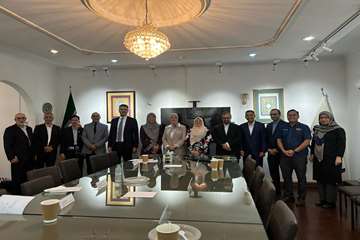Report on Improving Financial Well-being for Youth in Islamic Nations
_1_crop.jpeg)
The round table and economic conference in the cultural center of the Islamic Republic of Iran with the presence of the following guests at 9:30 am on Tuesday, 24/1/30, with their timely presence, started with the reading of verses from the words of God. The audience invited the key speakers to perform the speech first Honorable Cultural Advisor of the Islamic Republic, Mr. Dr. Habib Reza Arzani, while appreciating the presence of professors and thinkers in this field for attending the meeting, mentioned the economy and people's livelihood as one of the important issues for all societies, especially the Muslim society, and emphasized the emphasis of the religion of Islam on economic issues. And the livelihood of the people and mentioning the opinions of western scholars in the economic field, he considered the non-compliance of Islamic countries with the economic orders of Islam in business as one of the important failures of Muslims in the economic field, and noted that the way out of this predicament is self-reliance and compliance with religious orders in business. It is macro and individual because the need and reliance on others will result in economic slavery as it is currently being implemented.
The second speaker, Prof. Hezlina from U-P-M University, while enumerating the changes in economic power in this millennium, considered the most important factors to overcome the problems in 4 actions, which are skills - transfer
He mentioned energy and health in life and being flexible.
The third keynote speaker was Prof. Lafteh, the Cultural Advisor of the Embassy of the Republic of Iraq, who addressed the problem of young people after the Covid epidemic in Iraq and explained the way out of the problems of young people, a strong economic strategy - preparing jobs and careers, especially for women in different and related fields. and preparing jobs for young people.
The fourth keynote speaker was Dr. Irshad from the Social Science Department of U-P-M University, who considered the economic problem in Malaysia and in this regard, addressed the issues created after the Covid epidemic.
At this time, after a few minutes of breathing, the participants with essays started to speak to present their points of view. The first speaker was Dr. Khalil, the educational advisor of the Iraqi Embassy, who by examining the countries of Iraq, Iran and Malaysia in 6 areas of population - economy - employment - the effects of the countries West on the youth - examined the economic programs and the role of technology on these societies and presented the results of this research.
The second speaker was Professor Haz Lea, who completed his speech here and considered coaching - challenging goals - opportunities and mobility as the way to deal with the problems after the Kobd epidemic and opening the way for the youth to deal with it, and he spoke in praise of each of them.
The third speaker was Dr. Javani, a planning specialist from PATECH company, who presented the maturity model and the excellence model, which considered the maturity model as a conceptual framework in the fourth generation industry, and the organizational re-architecture and its implementation, which has 5 stages to reach the excellence model. added up
The fourth speaker was Professor Mohammad Fazli Sabri from the Faculty of Human Ecology of U-PM University, who presented ethical behavior and attitudes - financial and digital literacy - financial and economic resilience in Malaysia as a field of research and considered this to be one of the important issues in behaving correctly and He knows how to deal with problems at all levels.
The meeting entered into excitement and continuous discussion of solutions with an attitude towards all the issues raised. After 30 minutes of breathing and the gathering of the audience, the following matters were decided.
-1- Setting up a WhatsApp group
2- Presenting all opinions regarding a strong proposal
4- Comment platform of WhatsApp group
4- One and a half month for discussion and decision making of the proposal
5- A face-to-face conversation should be done before the next meeting
-6- Adding an AI expert to the present crowd
7- The possibility of a future meeting at the end of March
8- Any type of decision will be made on the platform of the WhatsApp group

